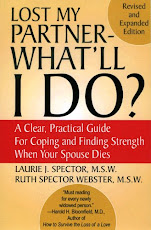
In our previous post, we looked at how your normal sleep is disrupted by the stress of losing your spouse/partner.
Now for our 7 most useful tips on dealing with that long stretch before your alarm goes off.
1) Use your bed for sleep only. If you have to get up, go into another room to read, watch or listen to something boring. Avoid mentally stimulating content.
2) Don’t look at the clock. Noticing how long it’s taking you to fall asleep can become another pressure.
3) If you’re too tense to fall asleep, get up and perform some mindless, repetitive housework, like vacuuming.
4) Write down any persistent thoughts or worries.
5) Listen to music or an audio book/podcast at such a low volume that the effort to hear will distract you from worrying thoughts.
6) Listen to a relaxation audio while still in bed.
7) Get some mild exercise, like walking, earlier in the day. If you have health issues, be sure to check with your doctor before attempting any activity.
If you find that some nights you just can’t relax enough for sleep, don't try to medicate yourself with alcohol. Instead, talk to you doctor about prescribing some medication on a temporary basis only!
If certain problems persist in affecting your sleep, consider talking them over with a trusted clergyperson or a licensed mental health professional.




